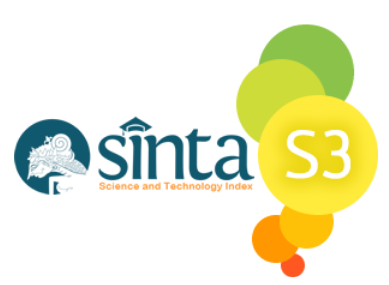A STUDY OF ALUMNI FEEDBACK ON PEDAGOGICAL CURRICULUM EVALUATION
Abstract
This study was aimed at investigating the need of alumni on the pedagogical knowledge and skills in their job as teachers and how sufficient the pedagogical courses offered at ELEP are in meeting the need of the alumni to do their job as teachers. To reach the objective of the study, survey method with cross-sectional design was employed. A set of questionnaire adapted from Tanriverdi & Apak (2013) study pertinent to pedagogical courses was distributed to alumni who are working as teachers. Responses from the questionnaires were analyzed to reveal the need of the alumni on the pedagogical knowledge and skill. Results of the analysis were further used to as a consideration to carefully select informants for an interview. From all the data collected and analyses conducted, it can be concluded that most pedagogical courses offered in ELEP are needed. However, few are in need refining that more practical knowledge is more accommodated so that the students can get clearer picture of the implementation in real teaching process. As for the sufficiency, the materials given in the pedagogical courses are relatively sufficient in equipping alumni doing their job as teachers.
Keywords
Full Text:
PDFReferences
Ary, D., Jacobs, L. C., Sorensen, C. K., & Walker, D. (2013). Introduction to research in education. Cengage Learning.
Billings, D. M., & Halsted, J. A. (2016). Teaching in nursing: A guide for faculty (5th ed.).St. Louis, MO: Saunders
Creswell, J. W. (2002). Educational research: Planning, conducting, and evaluating quantitative and qualitative research.4th ed. Boston, Pearson Education, Inc
Fletcher, A. J., Sharif, A.W.A., et al. (2016). Using the perceptions of chemical engineering students and graduates to develop employability skills. Journal of education for chemical engineers 1 8 ( 2 0 1 7 ) 11–25, http://dx.doi.org/10.1016/j.ece.2016.07.001
Havas, F., Keramati, M. R., Ahmadi, A. (2011). The quality curriculum evaluation in postgraduate studies of Educational Management and Planning in the public Universities of Tehran City. Procedia Social and Behavioral Sciences 15 (2011) 3723–3730 Available online on www.sciencedirect.com 2011 Elsevier Ltd. Retrieved on March 20, 2018
Khatimin, N., Wahab, A.D., et al.(2011). Postgraduate Alumni Survey of the Faculty of Engineering and Built Environment. Kongres Pengajaran dan Pembelajaran UKM, 2010, doi:10.1016/j.sbspro.2011.05.016
Kumm, S., & Laverentz, D.M. (2017). Concept-Based Curriculum Evaluation: 5-Year Process. Journal of Teaching and Learning in Nursing, 12 (2017) 242–245. http://dx.doi.org/10.1016/j.teln.2017.06.004
Nunan, D. (1992). Research methods in language learning. Cambridge University Press.
Peraturan Menteri pendidikan nasional Republik Indonesia Nomor 16 tahun 2007 tentang Standar Kualifikasi Akademik dan Kompetensi Guru
Richards, Jack C.(2001). Curriculum Development in Language Teaching. UK: Cambridge University Press.
Teng, C., Horng, J.S., et al.(2012). Academic perceptions of quality and quality assurance in undergraduate hospitality, tourism and leisure programmes: A comparison of UK and Taiwanese programmes. Journal of Hospitality, Leisure, Sport & Tourism Education 13 (2013) 233–243, http://dx.doi.org/10.1016/j.jhlste.2012.06.002
Valiga, T. (2017). Curriculum evaluation. InM. Oermann (Ed.), A systematic approach to assessment and evaluation of nursing programs (pp. 19–28). Washington, DC: National League for Nursing.
Van de Mortel, T. F., & Bird, J. L. (2010). Continuous curriculum review in a bachelor of nursing program: Preventing curriculum drift and improving quality. Journal of Nursing Education, 49(10), 592–595. http://dx.doi.org/10.3928/01484834-20100730-05.
Yu, R. (2017). Appropriating national curriculum standards in classroom teaching: Experiences of novice language teachers in China. International Journal of Educational Research Available online 11 March 2017. Elsevier Ltd. All rights reserved. Retrieved on March 20, 2018 www.elsevier.com/locate/ijedures
DOI: https://doi.org/10.18551/erudio.6-1.6
Refbacks
- There are currently no refbacks.
Copyright (c) 2019 Erudio Journal of Educational Innovation

This work is licensed under a Creative Commons Attribution 4.0 International License.












